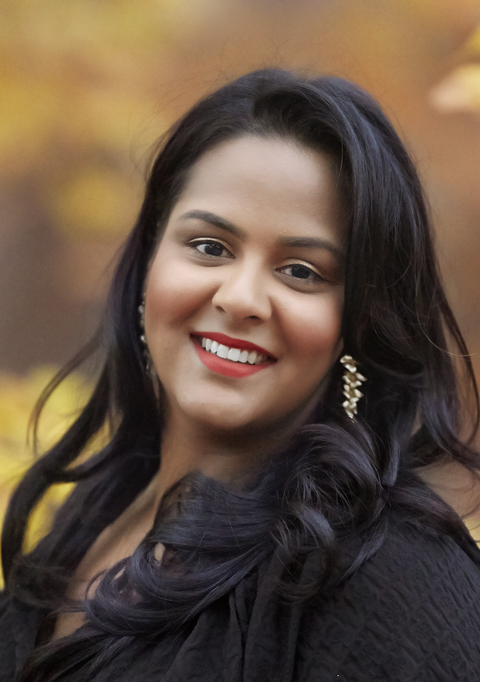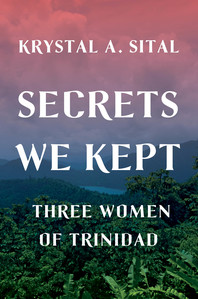TBR Tuesdays Interview with Krystal Sital, author of SECRETS WE KEPT

I kept hearing about Secrets We Kept: Three Women of Trinidad. Krystal and I were in the same Facebook binders group, but suddenly her book was everywhere: Electric Lit , Pop Sugar and Lit Hub, to name a few. I don't subscribe to a ton of email lists, but it seemed as if the ones I followed all were talking about Krystal Sital's book. Then I went to HippoCamp, and there she was, up at the podium.
This book is groundbreaking in how Krystal Sital tells her story, for unlike many memoirs, it explores her place inside her family of women--delving into the interconnectedness of trauma. Sital is truly a story keeper for several generations, and from the first moment when we met--in a hallway where she was surrounded by her own children--I was impressed with her strength and calmness. In a world that often encourages women to appear harder, colder, or somehow less maternal in order to succeed, Krystal is an inspiring voice for embracing femaleness and motherhood.
From the moment I picked up Secrets We Kept: Three Women of Trinidad, I was enthralled with the beauty of Sital's prose. The narrative is gripping, but the art with which she strings words together is simply gorgegous. I'm pleased to introduce you to her book, and to Krystal herself through this virtual interview.
About Krystal Sital:

An island spirit in every way, Krystal A. Sital calls the beach home and would rather be at the water’s edge than anywhere else in the world. Recently, she’s taken to mastering the cello and hopes to play it on the beach one day while her family sits at her feet in rapt attention (will never happen).
Krystal is the author of the critically acclaimed memoir Secrets We Kept: Three Women of Trinidad. A PEN award finalist and Hertog fellow, her work has appeared in The New York Times Magazine, The New York Times Well Section, Today’s Parent, Salon, The Margins, LitHub, The Caribbean Writer, and elsewhere. She’s taught writing, women and gender studies, and peoples and cultures of the Caribbean at New Jersey City University and Fairleigh Dickenson University. Krystal now teaches in the low residency program at Sierra Nevada College in Lake Tahoe.
On to the interview!
*What is one thing you wish you knew before publishing-is there anything you would do differently now?
I wish I knew more about the process. I went into this totally blind trusting I could figure it out along the way. But because it is such a long and overwhelming process and quite frankly an entirely differently world with its own rules, I often felt blindsided. Understanding the editing, production, publication, and marketing steps (just to name a few!) is important. It helps you know yourself and stand by what you want. While every publishing house does do it differently and people will keep reminding you of that, there are overarching formats they all adhere to.
As for doing it differently, I would do almost everything differently. To sit here and tell you exactly what would be another book. The takeaway from my experience would be to connect with other writers and freely share your experiences. Don’t be afraid to do that. Genuine working relationships foster an environment you’ll succeed in. One way to do that is through smaller, more niche conferences that have supportive communities in place.
*Have you ever met someone you idolized? What was it like?
I did. I won’t say who but it was terrible.
Given the chance to work with someone I’d respected and revered for such a long time, I snatched it. Think major icon in an industry. That’s who that person was to me and so many others. There’s a certain amount of emulation that happens in a master-apprentice relationship but it is unhealthy when the master craves and needs that kind of attention. It becomes less about you learning and more about you fawning. This is what was happening to me and those around me. It is damaging to the student. Once I recognized this was happening, I pulled away. But I was already deep into my apprenticeship and couldn’t leave so now I had to contend with others who were more than willing to do the things I never wanted to do. In the end, I knew it was a toxic environment, learned what I could from it, and moved on. It’s unfortunate that a lot of people feel powerless in these situations. The power someone can hold over you, someone who has mastered an art you are struggling to navigate, is strong. Fighting against that sometimes becomes a battle you no longer wish to be a part of and leads to you walking away.
In this case, that saying “Never meet your heroes,” rang all too true. But it hasn’t jaded me and I hope it never happens again.
* Share something that's always guaranteed to make you laugh.
My children. As we say on the islands, meh pickney. I’ve had a few health issues over the past few years and almost died twice because of them. It was then I truly experienced the innocence and brilliance of children from an adult perspective. They didn’t know their mother had almost died; to them I was just a bit unwell but would be up and about soon so life just unfolded normally. The things they say, the way their minds work is incredible. Unable to move around for a while, we spent quite a lot of time in bed and their ability to create worlds is magical. It’s so fun to hear Lady Galadriel wielding weapons against some amorphous God of Fire in the suburbs of New Jersey in the middle of winter. Oh and if you have questions, they’ll entertain them all because they have a very credible answer to every single question of mine.
* Talk about one book that made an impact on you.
This has to be a tough question for every writer. What usually happens when I get asked questions like this is I work backwards. You get to hear the most recent book that has shaken my world. But I can assure you that this book will remain one of the most impactful books I’ve ever read.
That book is Pachinko by Min Jin Lee. I will not give a synopsis or try to tell you what it is about because there is no way I can do it justice. I urge everyone to read it. Min Jin Lee deftly weaves together histories, oral stories, multigenerational narratives, cultures and lives while interrogating the scope of our understandings and views in this world like the Western idea of Asian beauty for men and women. I learned so much about a part of the world I knew just a little about. I saw the human condition in all its glory and folly. These characters are no longer characters but people to me. That is the mark of great fiction. I was moved so deeply I cried and moped, laughed and cheered. And like life, there were unsettling moments and parts that stay with me as I write this and as I continue to engage in the physical world around me.
There’s something to be said when you walk away from a book and you want to know more about that part of the world, that time, the author herself, etc. I’m still learning and sharing more and looking forward to reading her first novel as well.
* What's your secret or not-so-secret superpower?
Breastfeeding. I’ve managed to keep three humans each alive for well over six months with only milk from my body. That’s a huge fucking deal. Sure it happens everywhere and has been happening since the beginning of time. That doesn’t mean it isn’t huge.
My breastfeeding journey was very difficult and so I have an intense appreciation for this art (it’s totally an art!). My first child was born early and was in the NICU for three weeks. She was still very weak when she came home and we later realized she had a lip and tongue tie which made feeding painful (it was literally a bloody mess). I had the tongue tie corrected (I don’t recommend and will never do it again) but it was too late for us. So for twelve months I pumped exclusively (that’s a whole other book) and bottle fed her breastmilk. My second child also had a tongue and lip tie. I stretched it over the course of two months with my fingers while feeding her with a contact nipple shield. She brutalized my nipples through the plastic shield but eventually I was pain free. By the time my third came around (who also had a tongue and lip tie, I’m pretty sure this shit runs in families), my grandmother had passed on a nifty little trick midwives used to do back in the day: as soon as the baby is born, flick your fingernail under the baby’s tongue and it’ll cut the extra skin easily because everything is so soft (why the hell didn’t she tell me this before?!). Breastfeeding was still painful for over a month, but it was easier. In the midst of all of this I was an overproducer so I pumped multiple freezers full of milk. Once I got over my fear of not having enough, I donated my supply to NICU babies and other babies who would benefit from breastmilk. Over the course of the past six years, I’ve helped feed over ten babies. Damn straight this is a super power. And I’m so proud of it.
Buy Secrets We Kept: Three Women of Trinidad online, at your favorite local bookstore, or recommend the book to your library.
Find Krystal online at her website, Instagram, Facebook or Twitter.
